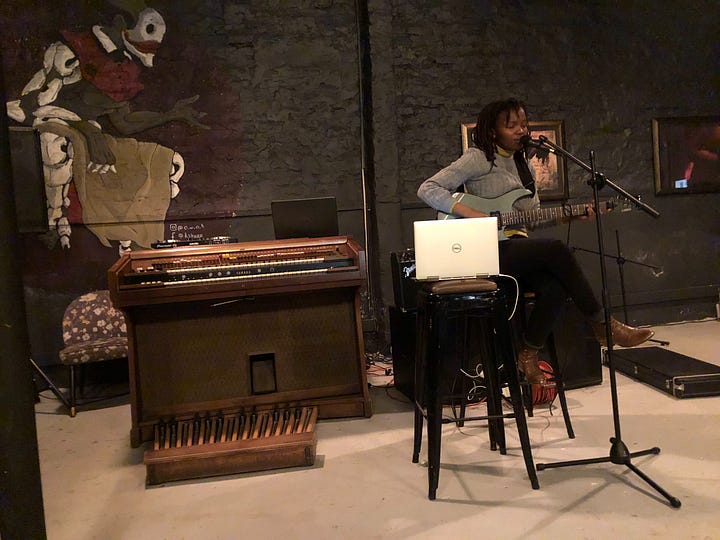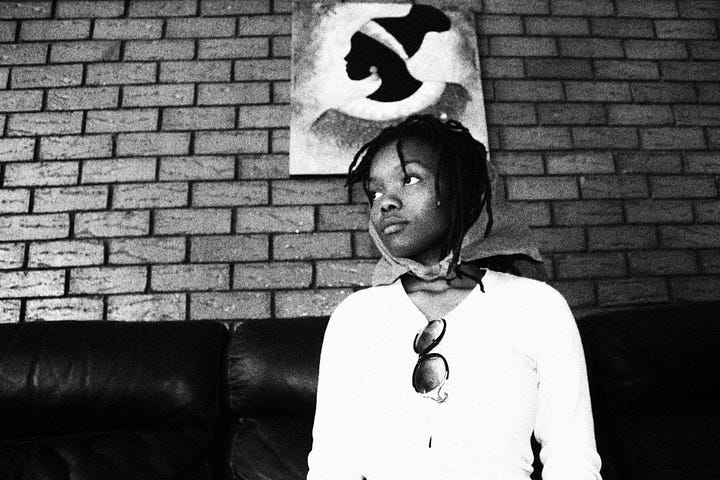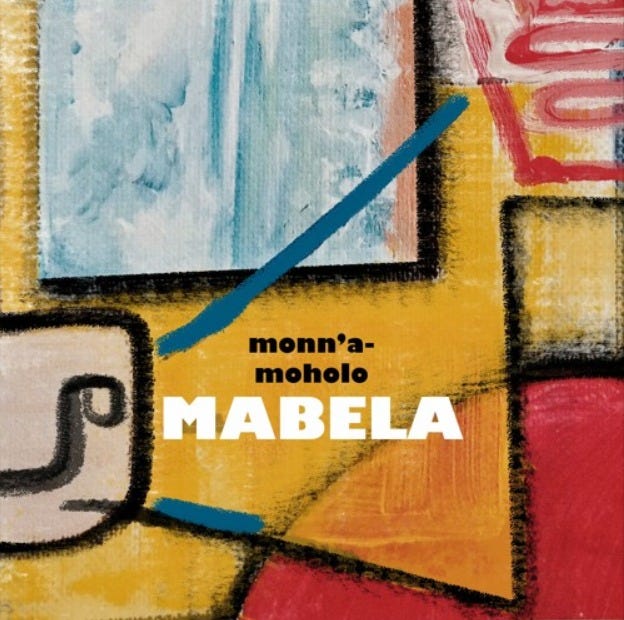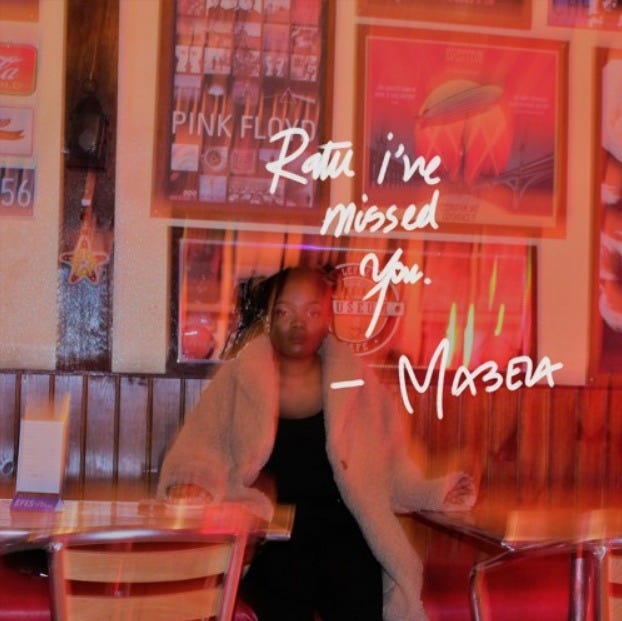Sounds of Home: Singer-Songwriter MABELA Reflects on her Debut Single 'Monna-Moholo'.
Introducing Sounds of Home, a subsection of our newsletter in which we will highlight fresh music from Lesotho through candid interviews with our local musicians and music compilations for your listening pleasure. In this first instalment of the Sounds of Home series, we speak to singer-songwriter, guitarist and beautifully budding producer, MABELA. The 22-year old musician from Maseru tells us about her relationship with music and lets us into the rich thoughtfulness that informs her music-making. Finally, she reflects on her debut single ‘Monna-Moholo’, a short yet profound ballad, that feels like both a lamentation on behalf of a neglected generation, the youth of Lesotho, as well as a firm critique of those in positions of power.


The interview below has been edited and condensed for length and clarity.
Can you tell our newsletter readers a little bit about yourself?
I'm Mabela, of the Phokeng clan. I like to sing and gather sounds to make some of my own.
How did your relationship with music begin?
I spent quite a lot of time alone growing up. And I didn't have the same access to regular devices of entertainment my mates had, so I had to be creative in keeping my spirits high. I've always liked singing, but never thought I was any good. I always felt like I lacked something. And I think picking up the guitar really did help me explore and try to fill that. In my mind, it gave me some level of leverage. What others could do and I failed at, I could make up for in guitar. Also, I thought that Jessie Reyez Figures video was pretty cool.
What kind of music do you make?
The kind of music I like to make is music I like. Music that is different from what people would have usually heard. I like to take inspiration from different cultures, people and sources. I think my music tends to be a mixture of everything I’ve ever heard, in ways that I would have liked to arrange it in. I like to make music that makes me happy. Music that I’m proud of. Music that I hope other people will relate to and find beauty in and find many different topics within it. I think a lot of music is about love, and I mean, while love is a beautiful thing, there are other beautiful aspects of life so I like to try to write about all the things that I find beautiful, things that maybe are slept on. And finally, the music I make is Sesotho music. Ke Mosotho and that aspect of me is always a part of my music.
“. . . I like to make music that makes me happy. Music that I’m proud of. Music that I hope other people will relate to and find beauty in. . . “
In this newsletter issue, we are reflecting on our independence as Basotho and I can't help but think of the first lines of your debut single "Monna-Moholo":
"Monna-Moholo o bua khotso, pula le nala/ Empa litloholo tsona ha li na le eona"
I'm curious, what were you thinking about when you wrote this song?
Monna-moholo came about after I heard of the youth march of 2020, where some youth got hurt. I found that to be such an eye-opening moment. This country was founded upon Khotso le Pula le Nala. Re e rutuoe re sa le banyane, e lipelong tsa rona kapa e tlameha hore e be lipelong tsa rona, e tsepame maikutlong a rona linthong tsohle tseo re li etsang.
And yet, these people who have experienced Khotso le Pula le Nala, who’ve been singing it for years and years on end, that is - the grandparents, the parents, the two to three generations that came before my generation, these people in power, ha u bone eka ba na le thahasello ea hore ba tšireletse bana ba bona le meloko e tlang.
So, Monna-moholo is referring to the generations that are in power, who’ve been singing this slogan for decades and yet bana ba bona- litloholo tsa bona -ha re e bone ntho eo ba e binang, ha re e bone ntho eo ba buang ka eona. It’s sort of become a greeting in the sense that it no longer has meaning when they say it. Ba e bua feela, ba e bina feela, at the end of the national anthem. It makes you wonder what this country was founded upon. If this is our slogan and it means nothing to the people who’ve been singing it for decades, then what is the point? What are we doing here?
“ Monna-moholo o bua khotso, khotso, pula le nala
Empa (empa) litloholo tsona ha li na le eona
U tsamaea u fupere pelo le matla oohle a tsona,
U hata ka boikokomoso bohle, u lebetse hore;
Lichaba (lichaba tsa bacha ke bona bajalefa)
Tsa bacha (ho sotleha hoa bona ke hona hoa hau) . . .”
Excerpted above: Lyrics to MABELA’s debut single ‘Monna-Moholo’.
We are caged in this system that was not made to protect us, not made to see to it that we are successful. They have stripped us of our power, of our voices, of our hearts. Because essentially, when you have no power in your situation, you end up losing your heart, your passion, your vigour and everything that you live for.
Ba shebela haufinyane mona. They are very short-sighted in terms of the country’s future. There is so much corruption - you see people who are trying to build a future for themselves and their immediate families or relatives. They do not realise that being rich, at the expense of everyone else, ha se borui. There is no good in that. There is no bravery in it, no courage, It’s disgraceful to say the least.
“ . . . Ba e bina feela, at the end of the national anthem. It makes you wonder what this country was founded upon. If this is our slogan and it means nothing to the people who’ve been singing it for decades, then what is the point ? “


And finally, what is success for you as a musician?
I'd like people to like my music. And for it to speak to them, ke ba tšelise, ke ba tšehetse, ke ba rorise, ke ba khaleme, ke ba qabole, whatever way I may touch their hearts for the better, that would be a win for me. Bophelo is difficult as is, if I can lessen that for even one person, I would be glad for it.
CONNECT WITH MABELA:





